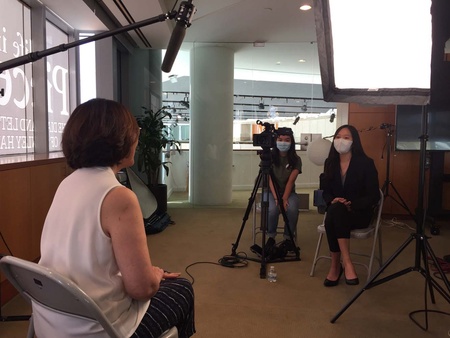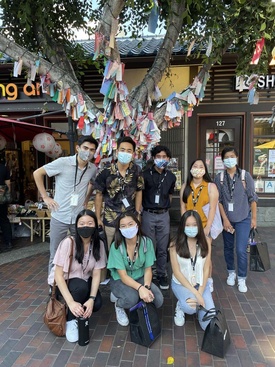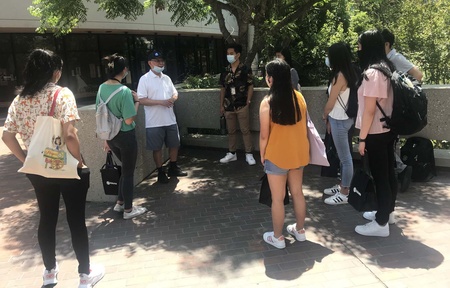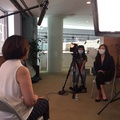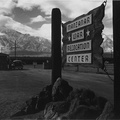I vividly remember the night that I called my friend from my school’s Nikkei Student Union about an internship that he had gotten the past summer. He told me about all of the inspirational people he was able to meet, all of the long-lasting friendships he made, and all of the professional skills he learned as a result of this internship. After we spoke about it, I immediately knew it was something that I wanted to participate in.
The Nikkei Community Internship program is run by Kizuna for the Los Angeles area in which each of us interns are placed with a nonprofit Japanese American organization that we will be working with over the course of 8 weeks. I had the honor of being placed with the Japanese American National Museum and the Japanese American Bar Association this summer.
Over the course of this internship, I completed four projects. My first project was an article about anti-Asian hate, a very prevalent topic in today’s society. My second project was an article for Discover Nikkei’s Nikkei Generations Series in which I wrote about my father being my role model. My third project is a joint project with the Japanese American Bar Association where I get to interview either an attorney or judge and then write an article about them. This summer, I got to interview attorney Patricia Kinaga and wrote my article about her influence on the community and the messages that I got from interviewing her. My last project was to create a reflection presentation based upon my experiences during the internship.
Additionally, I had the opportunity to meet and shadow various other attorneys and judges, which was such a wonderful opportunity for someone like me who is looking to go into law in the future. On Fridays, the Los Angeles-based nonprofit organization, Kizuna, hosts an “Intern Day” which is essentially a day reserved for all of us interns to learn more about Japanese American culture and history as well as enhance our professional skills. I have learned so much from this internship and each project has taught me something new.
For my first project, the article on anti-Asian hate, I wanted to emphasize the power of words. I focused on how words, or the lack thereof, have the power to either heal or destroy someone, so we have to be conscious of what we say. I explain how the government was quick to call the incarceration of Japanese Americans during World War II, “evacuation,” which is a term that generally implies positive connotations. This term is used mostly for when an organization moves a group of people for the sake of their safety, and moving thousands of people into incarceration camps was not for the incarcerees’ safety and was a complete violation of their civil rights. I then move on to interview a couple of people talking about their experiences of anti-Asian hate through words or the lack thereof. Finally, I explain how words can also have a very positive effect on people. The website, Stop AAPI Hate, is a platform where one can report a hate incident and learn about others’ stories as well. Hearing the words of others who are going through the same thing as you can be very healing.
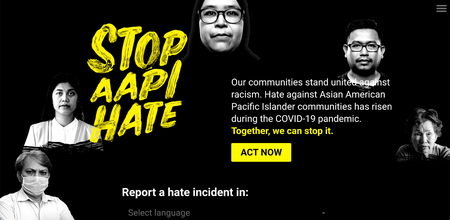
This article required a lot of research both in terms of the activism side of Asian hate as well as the legal side of hate crimes. I was also able to interview Janet Watanabe, a friend of my grandma’s, who was incarcerated at Poston camp in Arizona. Listening to her tell her story was one of the highlights of my internship experience because I had never spoken to anyone who had been in an incarceration camp before. It was as if I was traveling through time and able to see things through her eyes. I learned that after she was released from camp, she had felt so alone because none of her friends had asked her about her experience, apologized for what she went through, or seemed to have any sympathy. The lack of support and words from her classmates and friends really hurt her. I also interviewed my friend, Matthew Saito, about his experiences with racism. Through this interview, I was able to learn that we must speak up about what is right in order to make change and ensure that atrocities such as verbal racism ceases for good.
My next project was to write an article for the Japanese American National Museum’s project, Discover Nikkei, in the series, Nikkei Generations. I decided to write about my father, who has been my role model and has helped shape me into who I am today. In my article, I focus on three life lessons that he has imparted on me over the years: (1) to never give up or give into fear, (2) that the strength of one’s heart can overcome many limitations, and (3) that nothing is more important than family and those you love. Through his own life experiences and actions, he has exemplified how important these lessons are.
Through this internship, I was able to learn so much more about my father than I had previously known. I talked to him about his childhood, what it was like growing up, and how he got to where he is today. He faced many challenges and often had the odds stacked up against him, but he never gave up no matter how difficult it got. He passed down this lesson to me through coaching me in basketball and Kyokushin karate. He taught me the importance of not letting your fears get to you. Otherwise, it will take control of you and make it extremely difficult for you to perform at your best.
My father also persevered through the difficult times with the strength of his heart even when he seemed to be the underdog or when it seemed like his goals were impossible to accomplish. Additionally, I hadn’t realized until I was older how my dad had always prioritized my family. No matter how difficult or mentally or physically straining things got at work, he always put a smile on our faces and put time aside to spend with us. He was there at every single tournament and game cheering me on even though he had many sleepless nights and an unhealthy amount of stress constantly put on him.
Through this article, I was able to not only reflect on everything that my dad has taught me over the span of my lifetime but also learn many new things about my father that I had never known before. He truly is my role model and inspires me every day to keep going and fight for what’s right in my heart.
The third project that I was assigned is the joint project with the Japanese American Bar Association called the Legal Pioneers Legacy Project. Through this project, I got to professionally interview an attorney or judge and create an article about them. I had the privilege of being able to conduct this project with Ms. Patricia Kinaga.
Ms. Kinaga is not only an attorney who fights for justice, but also a mother and an activist. Having the opportunity to interview someone who has made a tremendous impact in not only her community but also around the world has been such an honor. We are always able to learn about someone’s achievements and successes through a simple Google search, but we hardly ever get to speak with them about how everything exactly made them feel, the personal and internal challenges they had to overcome to get where they are today, and truly feel the passion in their heart.
From my time interviewing Ms. Kinaga, she taught me three things to pass onto others. First, we must fight to give voices to those who do not have one. It is very important to help people who do not have the resources to get help and those who cannot fight for themselves. During her career, Ms. Kinaga focused on helping Asian domestic violence survivors, Asian women with breast cancer, and Asians with disabilities, all groups of people that were not widely recognized or supported at the time.
Second, when you have a passion for something in your gut, you will find a way no matter what. Even with no prior knowledge or experience with filmmaking, no equipment, and no crew, Ms. Kinaga found a way to create an Emmy-nominated film dedicated to helping domestic violence survivors.
Third, it is extremely important to balance different aspects of your life with your family. Although she has been extremely involved in her community and helping thousands of people around the world, she still sets time aside for her family, something that I, through my father’s impact on me and my family, believe is extremely important.
One of my favorite parts of the internship was when, just about every week, I was able to either shadow an attorney or judge at their office or have a virtual coffee with them over Zoom. This was one of my favorite parts of the internship because I got to learn the backstories of so many influential and successful people in my community. I was also able to expose myself to different aspects of the law as well as to get insights as to how it is in the law field. I hope to become an attorney in the future, so the people I was able to meet were like role models for me. It was truly an honor to be able to connect with and meet such inspirational people.
Additionally, every Friday we would have something called an “Intern Day”. This day was reserved for all of us interns to learn more about the Japanese American community, about other Japanese non-profit organizations, as well as enhance our professional skills. Over the course of this internship we had two in-person intern days where we visited Little Tokyo.
On the first in-person intern day we received a tour of Little Tokyo from Bill Watanabe, one of the founders of the Little Tokyo Service Center. This tour has been one of my favorite activities out of all of our intern days because, although I have been going to Little Tokyo ever since I was young, I had no idea about the historical significance of Little Tokyo and all of the artifacts that are there. It was very interesting to learn more about the people I came from as well as the place that I used to visit with my family all the time. It was also very interesting to learn about all of the other nonprofit organizations in Little Tokyo. We met some very important and influential people who have helped make Little Tokyo what it is today. I hope that with the skills and experiences that I have acquired over the years that I will be able to give back to my community just as many of the people we met have as well.
Over the course of this internship I have learned so many things not only about myself but also about where I came from. I have also had the opportunity to meet with such inspirational people who have made a huge impact in both Little Tokyo and around the world. I am so glad that I decided to apply for this internship and was granted the opportunity to participate in it. I am beyond thankful and cannot wait to use these experiences to help better others and my community in the future!
*This is one of the projects completed by The Nikkei Community Internship (NCI) Program intern each summer, which the Japanese American Bar Association and the Japanese American National Museum have co-hosted.
© 2021 Laura Kato


